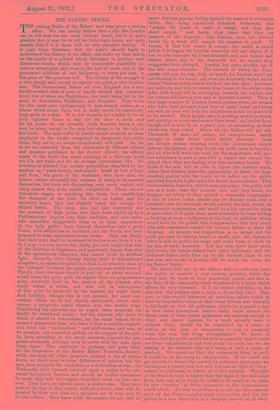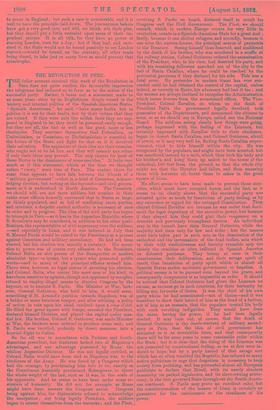THE BAKERS' STRIKE.
T us HE coming Strike of the Bakers' men may prove a serious affair. We can hardly believe that a city like London can be left even for one week without bread, but it is quite possible that it may be so left for forty-eight hours, and quite certain that if it is there will be very extensive rioting. It is high time, therefore, that the public should begin to understand the history of the affair, and make up their minds on the merits of a quarrel which threatens to produce such disastrous results, which may by conceivable possibility in- volve a catastrophe, and must in the best of cases end in the permanent addition of one halfpenny, or seven per cent., to the price of the qnartern loaf. The history of the struggle is a very simple and, except as regards one point, a very familiar one. The Journeymen Bakers all over England are a very hardly-worked class of men, so hardly worked that compara- tively few of them are Englishmen, the trade being left in the main to Scotchmen, Welshmen, and Germans. They work for the most part underground, in over-heated cellars, at a labour which seems light, but is really severe for excessively long spells at a time. It is not unusual for a baker to be on duty eighteen hours a day for six days a week, and for six hours on the seventh, while fourteen hours a day may be taken, except in the very best shops, to be the rule of the trade. The men suffer in health almost as much as those employed in the trades recognised as dangerous, but unlike them, they are by no means exceptionally well paid. As far as we can ascertain from the statements by different writers and speakers published in the Bakers' Record, the official organ of the trade, the usual earnings of a first-rate hand are 27s. per week, and for an average journeyman 25s. No overtime is allowed, but certain perquisites, described by the masters as "yeast-money, sack-money, bread (a loaf a day), and flour," are given to the workmen, who have also, we believe, rather unusually fair chances of rising to be masters themselves, the trade not demanding very much capital, and being almost free from outside competition. These are not starvation wages, or anything like them, but considering the character of the work, its effect on health, and the excessive hours, they are slightly below the average for skilled hands. The men, who feel like everybody else the pressure of high prices, who have been stirred up by a Parliamentary inquiry into their condition, and who enter- tain somewhat exaggerated ideas as to their importance in the body politic, have formed themselves into a great Union, with affiliations in Scotland and the North, and have proposed to their employers certain terms. They ask, firstly, that their stint shall be shortened to twelve hours, from 4 a.m. to 4 p.m.,—a very severe day, thirty per cent. longer than that of the Builders or Engineers, and practically longer than that of the agricultural labourers, who cannot work by artificial light. Secondly, that Sunday baking shall be discontinued altogether, or separately paid for,—that is, in practice, done by the "jobmen" to whom the regular journeyman would leave it. Thirdly, that over-time should be paid for at about two-and- a-half times the price paid for regular time,—a preposterous price, avowedly rued in the interest of the jobmen, who could defeat a strike, and who will in consequence of this price be preferred by the masters for night work. And fourthly, though this is not pressed, for some con- cession, which we do not clearly understand, about sack- money, a perquisite better thrown into the weekly wage. Considering the universal rise in wages, these proposals can hardly be considered unfair ; but the masters, who have to think, it should be remembered, for the small bakers, by no means a prosperous class, who have to face a terrible competi- tion from the " undersellers " and adulterators, and who, as we imagine, rely somewhat unduly on the support of the pub- lic, have, according to the latest accounts, rejected the pro- posals absolutely, refusing even to confer with the men upon those bases. This resolution is, perhaps, not quite final, for the Committee of the Master Bakers' Protection Society, while rejecting all other proposals, advised a day of twelve hours, so there must be some differences of opinion, but the men have accepted the resolution as a declaration of war. On Wednesday their Council resolved upon a strike, to be uni- versal throughout London, and should no further concession be made, they will, we imagine, keep their word, for four rea- sons. They have, as regards hours, a perfect case. They have gone so far that if they recede without a strike, they will be taunted by their own class as a spiritless set of men, only fit to take orders. They know what the masters do not, that in many districts popular feeling against the masters is extremely bitter, they being considered dishonest tradesmen, who "poison the bread to make it weigh, and then give short weight ; " and lastly, they fancy that they are masters of the situation ; that London, once left without bread for a week, will compel the masters to yield. Of course, if that last reason is correct, the battle is ended before it is begun, for London assuredly will not starve, if it has to take example by Constantinople, and nail bakers and bakers' men's ears to the doorposts, but we suspect they exaggerate their strength. London has many mouths, but it has also many resources. The biscuits of which the Times speaks will not, we fear, help us much, for London would eat out Reading in six hours; and even the Admiralty stores, which helped Paris so much, would not hold out two days ; but there are railways, and within twenty-four hours of the strike trains laden with bread will be converging towards the capital, and the costers will have a new and a splendid harvest. Then a very large number of London houses possess ovens, all women who have been servants know how to make bread, and every one with an oven will help her neighbours, either for good-will or for reward. Then people can eat pudding as well as bread, and porridge is much wholesomer than bread ; and boiled flour, though not so nice, is at a pinch just as sustaining as flour which has been baked. Above all, the Bakers will get aid. Thousands of men—all sailors, for example—are handy enough to make bread under skilled direction ; there are always women wanting work ; the journeymen clearly distrust the jobmen, or they would not bribe them so heavily ; and all who will work can work, for the magistrates will pro- tect volunteers in such a case with a vigour not always dis- played when they are dealing with less necessary trades. We doubt if the men will be able to injure the masters much, unless East London takes the opportunity to finish its long- standing quarrel with the trade, or to inflict on the public anything beyond a fright and a few hours' inconvenience. That inconvenience, however, will be most annoying ; the public will not, as a body, take the masters' side, and they would, we imagine, act wisely if they offered a reasonable compromise. A day of twelve hours, special pay for Sunday work, and a moderate rate for overtime, would content the men, would be a reasonable compromise, and would be a fair excuse for doing at once what, it is quite clear, must ultimately be done, adding a farthing or even a halfpenny to the loaf, an addition which would have for the public this compensation, that they• could with safe consciences compel the inferior bakers to leave off cheating. At present, the competition is so savage and the profit per sack on inferior bread so small, that the dishonest baker is able to justify his mean and cruel form of theft by the plea of trade necessity. Let the men have their extra half-crown, the honest bakers their extra halfpenny, and the dishonest bakers daily fines up to the farthest limit of the new law, and no one in London will be much the worse for the Bakers' Strike.
The threat held out by the Bakers will, nevertheless, force the public to consider a very curious question, which has never, that we know of, been practically raised, and that is, the duty of the community when threatened by a strike which affects its very existence. Is it to endure anything, on the plea that the strikers have a right to do as they like ? Sup- pose, to take crucial instances, all merchant sailors struck at once for impossible terms, so that Great Britain was virtually in blockade, or that all policemen struck for a pound a day, or that these journeymen bakers really could execute the threat some of their rasher spokesmen are senseless enough to utter, and starve London for a week, actually leave it without food ; should we be combelled by a sense of justice, or fair play, or compassion, to look on passively while the ruin was being accomplished ? We know, of course, that the public would not look on passively, that it would use force unhesitatingly and very much too soon, but we are talking of the abstract right and wrong of such a course of conduct. We cannot see that, the community being in peril, it would be at all wrong to employ force. If we could not get recruits to defend the country by voluntary enlistment, we should pass a conscription law, and it is just as right to "levy" sailors, or policemen, or bakers, as to levy soldiers. The right of the State to exist is higher than the right of the individual to be free, and all it would be bound to do would be to make its new "service " as little oppressive as the circumstances would admit. No case so extreme as to call out this reserved right of the State—a right much more perfect and not less perfect in a free State than in a despotic one—is at all likely to occur in England ; but such a case is conceivable, and it is well to have the principle laid down. The journeymen bakers have got a very good case, and will, we think, win their plea, but they should put a little restraint upon some of their im- prudent orators. It is all talk, for they have no power of starving London, even for a day ; but if they had, and exer- cised it, the State would not be bound passively to see London starved,—would be bound, on the contrary, all other roads being closed, to take just as many lives as would prevent that catastrophe.



































 Previous page
Previous page